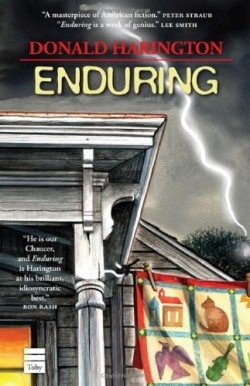Enduring
“The secret of enduring is not to harden oneself against loss but to soften oneself in acceptance.” Enduring, the latest novel by Donald Harington, depicts 121 years of American history through the life of a very old woman. Panoramic episodes explain how Latha Bourne Dill relates her experiences of love, tragedy, and triumph to her town, Stay More, Arkansas: a microcosm of rural America during the twentieth century.
Latha, who is Gran to the Bourne family, is asked to write down her memories. She complies with stories of how the town’s earliest white ancestors came from Elizabethan England to Appalachia, and then on to the Ozarks. She describes her youth, why she leaves Stay More, and what brings her back. Her anecdotes detail her family’s life and that of other residents: girlhood friends, revenuers, preachers, and strangers in their small, hidden village.
After a childhood of learning in a one-room schoolhouse, carrying her lunch in a lard pail, and enjoying lightning bugs, mud pies, and rainbows, Latha becomes an adult in 1917 as the Great War takes her two suitors away. One of them, Every Dill—home on furlough—rapes her; the other goes missing in action. Pregnant, she is forced to leave Stay More and live with a sister and her husband. That couple is childless and contrives to commit Latha to an insane asylum and take the baby as their own.
During her years of absence from Stay More, Latha realizes her love for her roots, and her simple need for her ordinary hometown. She grows in wisdom as she accepts that life’s happenings cannot be explained—it is just the way things are, full of “…cycles and seasons and synchronicities.”
Harington, who was given a Robert Penn Warren Award and an Oxford American award for Lifetime Achievement in Literature, has written many other novels about his characters in Stay More. He skillfully details the place and its life with songs and folktales, wildflowers and weeds, rhymes, riddles, and cats. He brings the reader into the action, filling plots with tension that force the reader to catch her breath. He writes of sexual fantasies and graphically real sex, escapes, fights, and the old-fashioned general store. Many stories within the story depict the era in explosive color—the greatest period of development in America—as abundantly rich as can be absorbed in one book. (September) Mary Popham
Disclosure: This article is not an endorsement, but a review. The publisher of this book provided free copies of the book to have their book reviewed by a professional reviewer. No fee was paid by the publisher for this review. Foreword Reviews only recommends books that we love. Foreword Magazine, Inc. is disclosing this in accordance with the Federal Trade Commission’s 16 CFR, Part 255.

